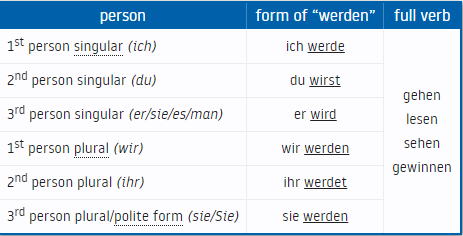Futur I – Future Tense in German Grammar

The future tense in German (Futur I) is mostly used to express assumptions about the present or future in German. We can also use this tense to express future intentions, although, in spoken German, it is more common to use the present tense for this. We can translate the future tense with the English tenses: simple present or future with will or going to.
Futur I – Future Tense in German Grammar
The future tense in German (Futur I) is mostly used to express assumptions about the present or future in German. We can also use this tense to express future intentions, although, in spoken German, it is more common to use the present tense for this. We can translate the future tense with the English tenses: simple present or future with will or going to.
Example

Usage
We use the German future tense to express:
- a future intention
Example: Morgen werde ich die Akten sortieren.
- an assumption about the future
Example: Das wirst du nicht an einem Tag schaffen.
- an assumption about the present
Example: Sein Büro wird wohl immer noch so chaotisch aussehen.
Conjugation of German Verbs
To conjugate verbs in the future tense, we need the finite form of werden and the infinitive form of the full verb.

To Note
We often strengthen assumptions by using words such as: wohl, sicher, bestimmt (likely/probably, surely, certainly). Since these words clearly show that we’re making an assumption, we can also use the present tense here
- Example: Es wird wohl schon spät sein. = Es ist wohl schon spät.
- Er wird sicher keine Zeit haben. = Er hat sicher keine Zeit.
- Sie wird bestimmt zu Hause sein. = Sie ist bestimmt zu Hause.
Also you can Improve your German with Learning German App.


























